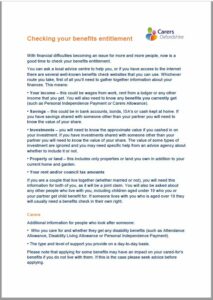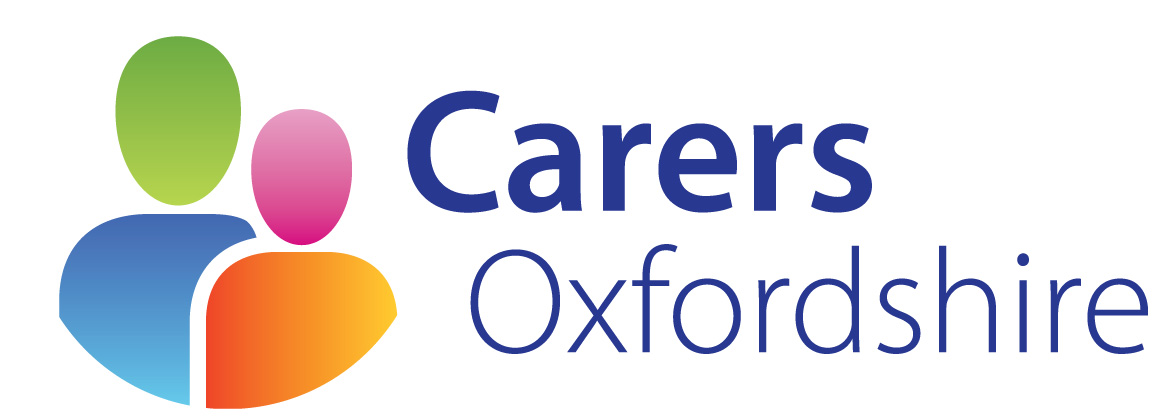Benefits
With the rising cost of living it’s more important than ever to find out about financial help. There are many different benefits and one-off payments available. The list is forever changing, which can be confusing when working out which ones you’re entitled to. We’ve put together an up-to-date list to help you.
It’s important to remember that there is a cap on benefits in some circumstances. If you already receive income-supporting benefits (such as Employment and Support Allowance, Job Seekers Allowance, Income Support or Tax Credits) get specialist advice before applying for new or additional benefits.

Benefits for carers of all ages
Cost of Living Payment is £900 paid in three lump sums of £301 (spring 23), £300 (autumn 23) and £299 (spring 24). You may get it if you’re getting any of the following during 26th Jan and 26th Feb 2023: Pension Credit, Universal Credit, Income Support, income based JSA or ESA. There is no need to apply; it will be paid automatically if you are eligible. If there are problems call the relevant benefit office.
Payments appear in the same bank account that your benefits get paid into. They are grants, so do not need to be paid back.
Council Tax Reduction provides financial help towards your Council Tax. You may be eligible if you either claim means-tested benefits, are on a low income, or if you or someone you live with is disabled or severely mentally impaired. The discount ranges from 0-100% depending on income and circumstances. There are different rules for applicants of working age and pension age. To find out more contact your district council.
Housing Benefit can help you pay your rent if you’re unemployed, on a low income or claiming benefits. It’s being replaced by Universal Credit. You can only make a new claim if you’re pension age or in supported, sheltered or temporary housing. You can apply as part of a pension credit claim or contact your district council.
Energy Price Guarantee has been launched by The Government to help households with rising energy costs. It limits how much you’ll pay for each unit of gas and electricity you use. This means your bill will now only be affected by how much energy you use not the volatile cost of energy. This is estimated to save the average household just over £1,000 a year compared to predicted bills under the previous October 2022 price cap. You can estimate your bill based on the energy you use with Money Saving Expert’s calculator.
Warm Home Discount Scheme offers a one-off reduction of £150 on your electricity bill for winter 2023. It will be paid between October 2023 and April 2024. You may be entitled to this if you receive certain benefits such as Universal Credit, Income Support, income based JSA or ESA or certain tax credits. You or your partner must be named on the bill. If you live in a park home and pay utilities in your rent apply via www.parkhomeswhd.com. Contact your electricity supplier to see if you’re eligible, they don’t all offer it. If you get the Guarantee Credit element of Pension Credit then the discount will normally be applied automatically.
Cold Weather Payment Scheme gives £25 for each 7-day period of very cold weather (0°C or below) between 1 November and 31 March. It is available if you get certain benefits or Support for Mortgage Interest. The discount will not affect your Warm Home Discount or winter fuel payment. There is no need to claim; it is paid automatically.
Waterhelp scheme from Thames Water offers financial support for low-income households, with either a 50% discount on your water bill or a bill cap. The scheme also provides support if your payments are behind. For more information visit www.thameswater.co.uk/support or call 0800 009 3652.
NHS Low Income Scheme provides support with healthcare costs including NHS prescriptions, dental care, and glasses. Eligibility depends on your income and savings. Apply online at www.nhsbsa.nhs.uk/nhs-low-income-scheme or call 0300 330 1343.
Benefits for carers of working age
Carer’s Allowance is a £76.75 weekly payment for those that spend at least 35 hours a week caring and earn £139 or less a week. Earnings are calculated after deducting allowable expenses, such as tax, National Insurance, and some pension contributions. If you’re claiming Universal Credit, you may get a carer element even if you earn over £139 a week. Carer’s Allowance is a complex benefit that ‘overlaps’ with some payments, such as State Pension. Claiming it can affect the benefits of the person you care for if you don’t live with them. In these circumstances, it’s important to get specific advice before applying. To claim call the Carer’s Allowance Unit on 0800 731 0297 or visit www.gov.uk/carers-allowance/how-to-claim
Universal Credit is a monthly payment to help with living costs. You may be able to get it if you’re on a low income, unemployed or unable to work. The standard amount starts at £292.11 and varies depending on your age and if you are single or a couple. If you have a disability or children, you may be eligible for a higher amount. Universal Credit is replacing older benefits such as Job Seeker’s Allowance, Employment and Support Allowance, and tax credits. If you get one of these benefits you don’t need to make a claim unless you have a change in circumstances or have received a Migration Notice. For more information visit www.gov.uk/how-to-claim-universal-credit or call the Universal Credit helpline on 0800 328 5644.
Carer’s Credit is a National Insurance credit that helps with gaps in your National Insurance record. You may be able to claim this if your caring responsibilities have prevented you from being able to work and pay national insurance contributions. You must be 16 or over and under the State Pension age. If you get Carer’s Allowance or Child Benefit for a child under the age of 12 it will be automatically applied. Otherwise, you can claim by visiting www.gov.uk/carers-credit/how-to-claim or calling the Carer’s Allowance Unit on 0800 731 0297.
Benefits for carers of pension age
Pension Credit is a means-tested benefit for people over the State Pension age (currently 66). It is made up of two parts: Guarantee Credit and Savings Credit. Guarantee Credit provides a guaranteed level of income. The maximum weekly amount for 2022/23 is £201.05 for single people and £306.85 for couples. If you are a carer, have a disability, or have children, you may be eligible for a higher amount. Savings Credit is paid to people who reached State Pension age before 6 April 2016. It is worked out by looking at the level of retirement provision you have made. It may be paid as well as Guarantee Credit or on its own. The maximum weekly amount for 2022/23 is £15.94 for single people and £17.84 for couples. To claim call 0800 99 1234 or visit www.gov.uk/pension-credit/how-to-claim
The Pensioner Cost of Living Payment is an extra £300 on the standard Cost of Living Payment. It is paid in the same way as the Winter Fuel Payment. You must be born on or before 25th Sept 1957 and live in the UK during the third week of September 2023. If living in a care home or nursing home, must NOT be receiving Pension Credit, income-based ESA or JSA, Income Support. If you don’t get one, you need to apply by calling 0800 731 0160.
The Winter Fuel Payment ranges from £200 to £300 and is to help with your heating bills. It is automatically applied if you get the state pension. It will be paid between November and December 2023.
Disability benefits
Disability Living Allowance (DLA) is a monthly, tax-free benefit for disabled children aged 0-16. It is paid at different rates depending on the level of help needed. It has been replaced for those over 16 by PIP. However, if you have a historic DLA payment and were born before 9/4/1948, you can continue to receive DLA. The claim line for those aged 0-16 is 0800 121 4600.
Personal Independence Payment (PIP) is for disabled people aged 16 and over. It can help with extra living costs for those with a long-term physical or mental health condition or disability and difficulty doing certain everyday tasks or getting around. PIP can be claimed even if the person is working, has savings or is getting most other benefits. There are two parts to PIP: a daily living part – if help with everyday tasks is required; and a mobility part if help with getting around is needed. Whether the person you’re caring for gets one or both parts, and the amount they get, depends on how difficult they find everyday tasks and getting around. The Personal Independence Payment claim line is 0800 917 2222.
Attendance Allowance is for disabled people over State Pension age at the point they make their claim. It can help with extra living costs for those with a long-term physical or mental health condition or disability and difficulty doing certain everyday tasks. It’s paid at two different rates and the amount depends on the level of difficulty or care needed. To claim call the Attendance Allowance helpline on 0800 731 0122 or download a form from www.gov.uk/attendance-allowance and apply by post.
Disability cost of living payment is a one-off amount of £150 that will be paid to disabled people who received certain disability benefits. It will be paid automatically in Summer 2023.
Benefits leaflet
We have put together a benefits leaflet with more information.

Financial advice services
OSAS provide a dedicated service, to answer all your queries around benefits, money advice, budgeting and welfare issues. Give them a call on 01865 410660 or email advice@oxfordshiresas.org.uk
Turn 2 Us help people find financial support such as welfare benefits and charitable grants.
Our Useful Contacts page contains a list of financial advice services in the Oxfordshire area.
Help for Households – Get government cost of living support
